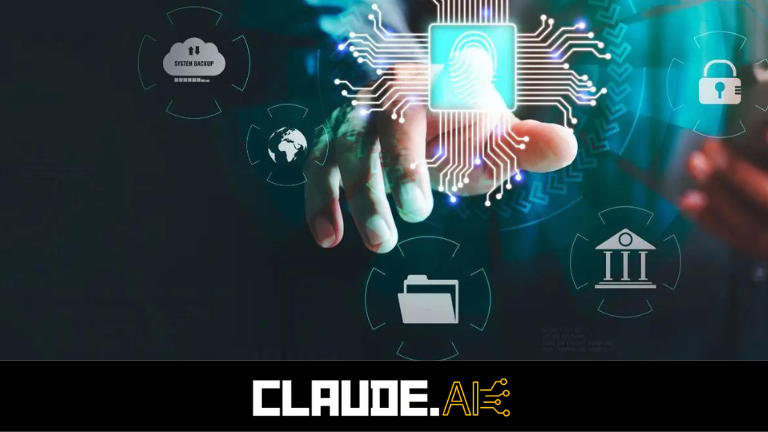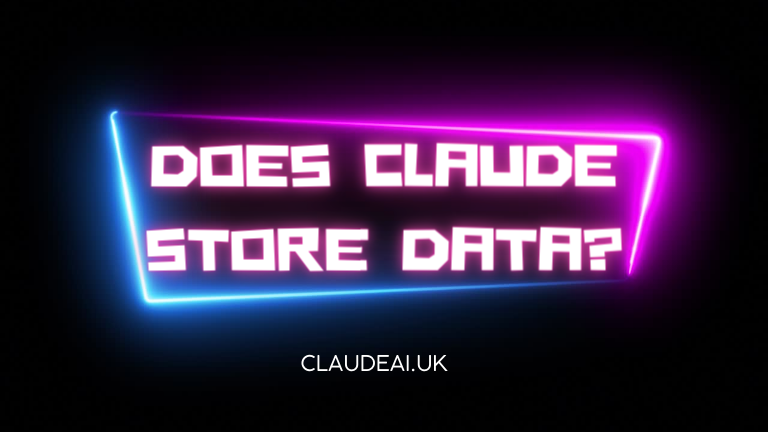Does Claude Store Data in 2023? As artificial intelligence (AI) becomes more advanced and integrated into our daily lives, an important question arises – what does the AI do with all the data it collects? Specifically, many wonder if Claude, the AI assistant created by Anthropic, stores user data.
What is Claude?
Claude is an AI chatbot developed by the company Anthropic to be helpful, harmless, and honest. It uses a technique called Constitutional AI to ensure its responses align with human values. Claude can understand natural language, answer questions, and have conversations on a wide range of topics.
Some key facts about Claude:
- Created in 2021 by researchers Dario Amodei, Daniela Amodei, Tom Brown, Chris Olah, Sam McCandlish, Jack Clarke, and Jared Kaplan.
- Funded by $124 million in venture capital from investors like Durable Capital Partners and Temasek.
- Currently available through a waitlist on Anthropic’s website and as a beta product. Wider release plans are unclear.
- Powered by a type of AI called a large language model – Claude’s is named Constitutional AI.
- Designed to be helpful, harmless, and honest using a technique called Constitutional AI. This aims to make Claude’s responses more trustworthy and aligned with human values.
So in summary, Claude is an AI-powered chatbot focused on natural conversations, not a general purpose assistant like Alexa or Siri. Its unique selling point is its Constitutional AI method of trying to improve safety and ethics.
How Does Claude Work?
Claude works by using a large language model trained on massive amounts of text data. Here’s a quick overview of how Claude functions:
- Claude’s foundation is Constitutional AI, which contains set rules that Claude’s responses must abide by to ensure helpful, harmless, and honest behavior.
- The Constitutional AI interacts with Claude’s general knowledge component, which is a 175 billion parameter language model trained on mountains of online text data. This gives Claude an extensive understanding of the world.
- For any user input, Claude combines its Constitutional AI biases and huge general knowledge to generate a response. The goal is for the response to be relevant, natural, and adhere to Claude’s Constitutional AI principles.
- Claude personalizes responses by maintaining a short-term memory of the conversation. This context allows it to have consistent positions and refer back to earlier parts of the chat.
- Claude can also connect parts of the conversation to its general world knowledge. So it may bring up relevant facts, examples, and talking points it has learned from its training data.
In summary, Claude relies on a massive language model trained on internet data to converse, with its Constitutional AI biases guiding it towards helpful, harmless and honest responses. Next, let’s explore Claude’s approach to data and privacy.
Does Claude Store User Data?
So does Claude AI actually store, use, and analyze data from user conversations? This is an important question when it comes to user privacy.
According to Anthropic’s privacy policy and public statements, Claude does NOT permanently store complete conversations or connect them to individual user profiles. Here are the key facts about Claude’s limited data practices:
- No Connecting Conversations to Individuals: Claude does not link conversation logs with usernames, IP addresses, account info or other identifiers. Conversations remain anonymized.
- Temporary Conversation Storage: Complete conversations are temporarily stored to train Claude, but are deleted after 7 days. Only a small sample of conversations may be kept for up to 6 months for R&D.
- Aggregated Training Data: Select trends, patterns and examples from conversations may be extracted and added to Claude’s general training data. But these are aggregated and separated from individual conversations.
- No Selling or Sharing Data: Anthropic pledges not to sell user data or share it with third parties like advertisers or data brokers. Data use is limited to improving Claude’s AI.
- GDPR Compliance: For EU users, Claude complies with GDPR privacy regulations like data access requests, deletion rights, and consent requirements.
So in summary – Claude does NOT permanently store entire conversations linked to specific users. It only retains temporary conversation records, extracts some aggregated training examples, and deletes other data.
Limitations of Claude’s Privacy Stance
Claude’s limited data collection practices point towards strong privacy protections for users. However, some limitations remain:
- Short 7 day conversation storage delay still poses some privacy risks.
- Extraction of aggregated training data from conversations has little transparency.
- As an AI system, Claude’s predictions about users still utilize their conversation data.
- Long-term risks remain around how data practices could change and how secure systems are.
- Legal means like subpoenas could possibly access some conversation data.
- Insufficient third party auditing to fully verify privacy claims.
So users ultimately need to weigh these residual risks versus the privacy benefits offered by Claude’s much more limited data practices compared to many Big Tech companies. There are arguments on both sides.
Implications for Users: Should You Trust Claude?
Given Claude’s privacy approach, should users feel comfortable having sensitive conversations with the AI chatbot? Here are some key considerations:
Potential Benefits
- Claude’s data policies are vastly more privacy-focused than companies like Google or Facebook.
- For many users, the 7 day storage and no linking to individual profiles offers reasonable privacy.
- Claude’s AI could provide helpful information, advice, and support lacking elsewhere.
Risks
- For extremely sensitive conversations, even Claude’s policies may not guarantee total confidentiality.
- Long-term risks around data practices and security are inherent with any online service.
- More transparency and auditing around Claude’s practices would help evaluate true privacy protections.
- Bugs, security breaches, or company policy shifts could still expose data unexpectedly.
Overall there are good reasons to believe Claude offers substantially stronger privacy protections compared to many technology companies that conduct widespread data collection and profiling. But for users focused on keeping conversation data totally private, some risks and limitations still exist. Each individual must weigh their own privacy sensitivities and tolerance for risk in deciding if Claude seems trustworthy.
The Future of AI Assistants and Data Privacy
Looking beyond just Claude, AI chatbots prompt big questions about the future of data privacy as the technology advances. A few key developments to watch:
- As AIs like Claude get smarter, their hunger for data to train on will grow. This could test companies’ commitment to data minimization principles.
- Government regulation will likely grow around AI and data practices. But regulatory action tends to lag behind tech progress.
- New techniques like federated learning, where AIs are trained on device without centralized data collection, could enable greater privacy.
- Fierce competition between tech companies could potentially push some to compromise on privacy in pursuit of AI dominance.
- As AIs become more human-like in behavior, the ethical standards around how their user data is treated may rise.
- Continued advocacy will be needed around issues like informed consent, data rights, and setting expectations on firms deploying AI.
The path forward remains uncertain – while Claude today may set a new bar for privacy, the incentives and pressures of the AI industry could erode those protections over time. But increased public scrutiny and debate can help set the tone for how these emerging technologies handle our sensitive data.
Conclusion
In closing, Claude represents an AI system that so far appears to take a substantially more restrained and thoughtful approach to user data compared to many Big Tech firms. While some risks and limitations remain, Anthropic’s Constitutional AI framework strives to ensure Claude stays helpful, harmless, and honest when it comes to privacy too. Looking ahead, users, advocacy groups, and governments will play key roles in shaping the data ethics of AI systems as the technology continues advancing rapidly. But if developed responsibly, Claude provides a glimpse of how AI could one day be both highly capable and aligned with human values like privacy.

FAQs
1. What is Claude?
Claude is an AI chatbot created by Anthropic to have natural conversations. It uses Constitutional AI to try to behave in helpful, harmless, and honest ways.
2. How does Claude have conversations?
Claude relies on a massive 175 billion parameter language model trained on internet data to understand language and the world. Its Constitutional AI biases guide it to generate responses.
3. Does Claude store complete conversations?
No, Claude does not permanently store entire conversations linked to individual users. Conversations are anonymized and automatically deleted after 7 days.
4. Does Claude use conversation data to train?
Yes, Claude extracts some aggregated trends and examples from conversations to add to its general training data. But these are not linked to individual chats.
5. Can Claude’s predictions identify users?
While Claude doesn’t link conversations to identities, its AI predictions can still utilize conversation data, posing some privacy risks.
6. What are Claude’s data limitations?
Limitations include short-term storage, lack of transparency, and legal/security risks. More auditing could help evaluate protections.
7. Should you trust Claude with private conversations?
It depends on your privacy sensitivities. Claude offers stronger protections than many companies, but some risks remain.
8. How could data practices change in the future?
As AI advances, companies may compromise on privacy to feed data-hungry systems. Regulation, ethics and advocacy will be balancing forces.
9. Does Claude sell or share user data?
No, Anthropic pledges not to sell data or share it with third parties like advertisers.
10. How does Claude handle EU user data?
For EU users, Claude complies with GDPR regulations around data access, deletion, consent, and privacy rights.

